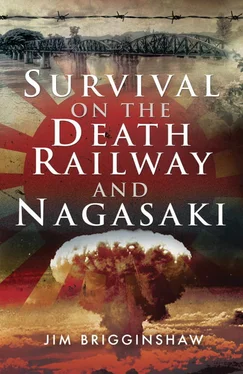The camp commander, Lieutenant Hayashi, was a cruel and arrogant Japanese who had to be avoided when he was drunk. Anyone who happened to be in his path would be punished for no reason. He often handed over the pleasure of inflicting pain to his second-in-command, a sadist who’d flay the victim with the buckle end of his heavy leather belt, slicing out large chunks of flesh with every blow.
Equally sadistic was the camp interpreter, a runt who liked to be called Matsu-san. He had a good command of English and was notorious for stalking around the camp observing any real or imagined faults and inflicting punishment.
Matsu-san persecuted sick or injured prisoners who had been placed on the no-duty list by Captain Higgins, the senior Australian medical officer. Captain Higgins, affectionately known as Cyclops because of his large, round spectacles, was allowed to draw up this list to allow the sick and injured to rest from work that day.
Matsu-san regarded no-duty men as malingerers. He’d drag them out of their beds and make them clean grounds that were already clean, pull up weeds or carry out any other tasks he could find.
On one of the all-too-rare rest days, a camp concert was held in the mess hall. The place was packed for the performance, and guards patrolled outside.
A piano had been found somewhere and Leonard, a prisoner who’d been a jazz musician in Australia before the war, brought back plenty of musical memories.
Prisoners from all parts of the world contributed to the concert program, even the Mexicans. Two of them, from the 105th Artillery Regiment, sang unintelligible songs of their homeland.
Jim Bodero had written a verse about the obnoxious Japanese interpreter Matsu-san and, after weighing up the risk, decided to recite it.
He’s stranger sure than fiction, could be one of Ripley’s pars,
He’s invaded our no-duties squad as Speed Gordon did to Mars.
How he came upon this earth is a matter for debate,
The date and manner of his birth is a mystery at any rate.
He shows a strain of monkey yet is of man and woman born,
You see he’s partly animal and partly human form.
He’s thrown our doctors, danchos, suijis and whatnot,
Even Snowy Heron’s bucking mule couldn’t buck this blasted twat.
He’s just another mutton flap, another of that bastard race
Of slimy, crawling creatures, a reptile really out of place.
And if you should chance to meet him without a shuushin tag,
Then he’ll grab you for some dirty job, the syphilitic lag.
He has more dirty crafty tricks than our RAP has pills,
He’s shown more rotten lousy points than a porcupine has quills.
To see him makes one savage, burst a vessel, throw a fit.
I’d like to choke the Eastern skunk and dip his head in shit!
I hate his slant-eyed physog, this four-eyed little shark,
I’d treat him as the Sydney barber did the Man from Ironbark.
But I guarantee no tale he’d tell to any of his thieving clan,
For I’d use the sharp edge on the throat of that bastard Matsu-san.
Then no more would danchos bother us and doctors would be free
To exercise authority and give a rest to you and me.
So if by chance fate should be kind to me as one who pleads,
Then ‘No Duties’ need not pray for rain to stop pulling blasted weeds.
[Some words in the verse need explanation: shuushin is sleep, dancho is group leader, and suiji is cook. Snowy Heron, the camp suiji , was forever reciting Banjo Paterson poems, hence the reference to the Sydney barber ( The Man from Ironbark ) and the bucking mule ( The Man from Snowy River ).]
While Bodero was reciting his uncomplimentary verse at the concert, Matsu-san entered the hall. When the Australians saw him, they signalled frantically to Jim to stop. Blithely unaware that Matsu-san was taking it all in, he continued.
Matsu-san listened until Bodero had finished, then dragged him off to the guardhouse. The punishment wasn’t as bad as Jim thought his verse warranted. He was subjected to some vicious face-slapping and made to stand to attention for a couple of hours. Bodero had expected far worse.
The rest of the prisoners, when they saw that he was still alive, said the description of Matsu-san was spot-on.
There was great excitement among the hungry prisoners when the Japanese announced that parcels from the American International Red Cross were to be issued.
The Red Cross had expected that each man would get a parcel, but when they were handed out, each parcel had to be shared by ten men, and the Japanese told the prisoners they weren’t allowed to touch the contents until permission was given regarding what to eat and when to eat it. The unopened parcels, containing concentrated food, much-needed medical supplies, cigarettes, chocolate and biscuits had to be left where they were within sight and reach of the hungry men. It was additional, intentional torture. They could see them, but weren’t allowed to touch them.
The outcome was predictable. Within a week, a Japanese inspection of the parcels found that they contained only empty tins and packages.
All hell broke loose. The Japanese camp commander, furious that his orders had been disobeyed, ordered that anything remaining in the parcels be confiscated. In addition, the men were to receive no rations for two days.
No rations meant that they were starved even further. The parcels that had been meant to help them in their hunger had had the opposite effect.
Still, they remembered the cabbages, pumpkins and pigs. If the Japanese guards had remained true to form, the prisoners would have had nothing from the parcels.
CHAPTER TWELVE
9 AUGUST 1945 – THE EARTH SHOOK
IN about the middle of 1945, Lieutenant Hayashi was in his cups when he let drop to Australian officers that Deutschland was finished, but Japan would fight on and never be defeated.
If Japan was invaded, he said, the Sendryu prisoners wouldn’t live to see it. ‘You will all be bayoneted.’
The news of Germany’s capitulation flashed around the camp and raised new hope among the prisoners that the war could be nearing an end. Now the full Allied weight would be thrown against Japan. They knew that if Japan was invaded, these fanatics would die rather than surrender on their own soil. And they knew, too, that Hayashi’s threat to kill the prisoners was genuine. Dead men could not report atrocities.
There was a change of guards at the camp in July 1945. Older Japanese replaced the young ones who’d hated the white man and made life hell for them. The new arrivals, past their prime and unfit for active service, brought a change in Japanese attitude towards the prisoners, both in the camp and down the mine. No longer were they beaten and tortured for minor infringements such as failing to bow or salute. The older guards went out of their way to make friendly conversation and offer help, even handing out cigarettes or some other little luxury.
Outside the camp, there were signs of growing unrest. Civilian workers watched the sky anxiously for planes, and air-raid sirens began to wail frequently, a sound that was music to the prisoners’ ears.
Whenever aircraft were seen overhead, the guards asked whether they were Nippon or American. The prisoners always told them they were American B-29 bombers, whether they were or not. It never failed to trigger a Japanese rush for the air-raid shelters, huge tunnels cut into the surrounding hills.
At times, explosions from bombing raids could be heard in the distance towards the west coast of Kyushu. The war was coming closer to the mainland of Japan, giving the prisoners new heart, even if invasion meant their own deaths by Hayoshi’s bayonets.
Читать дальше












